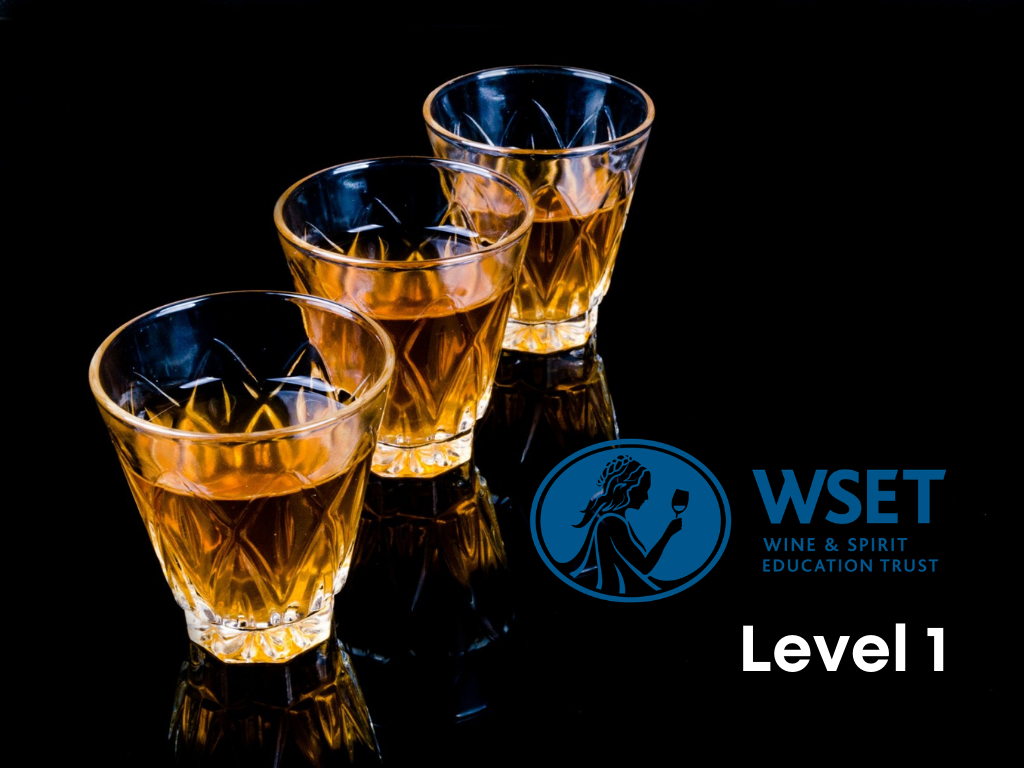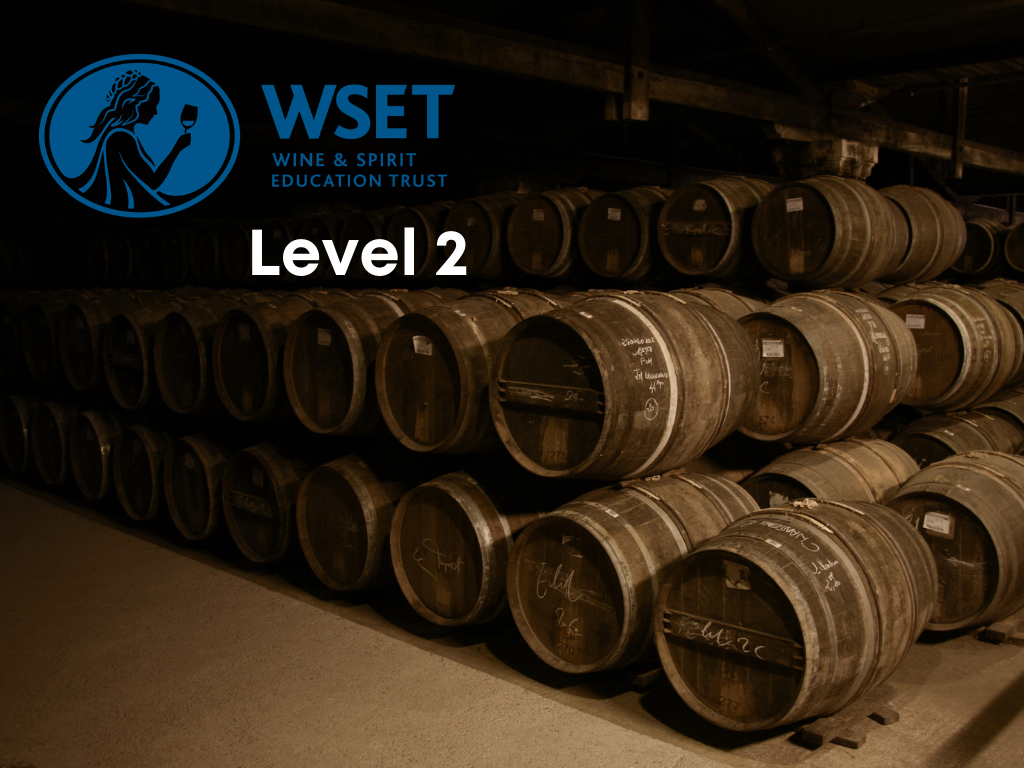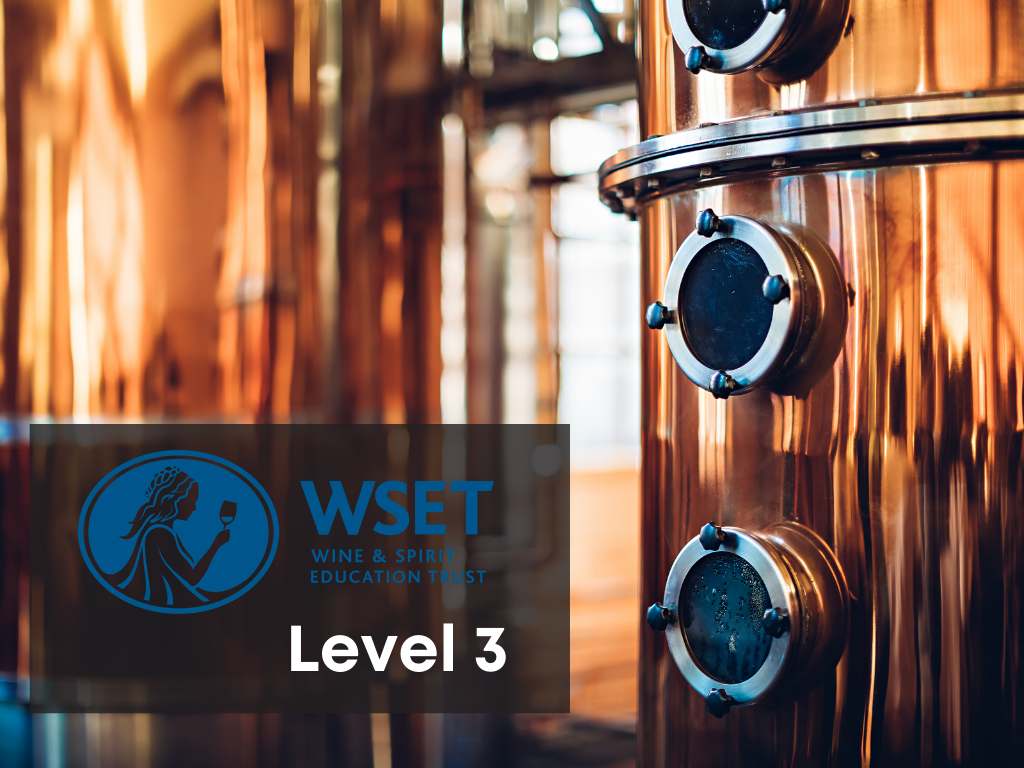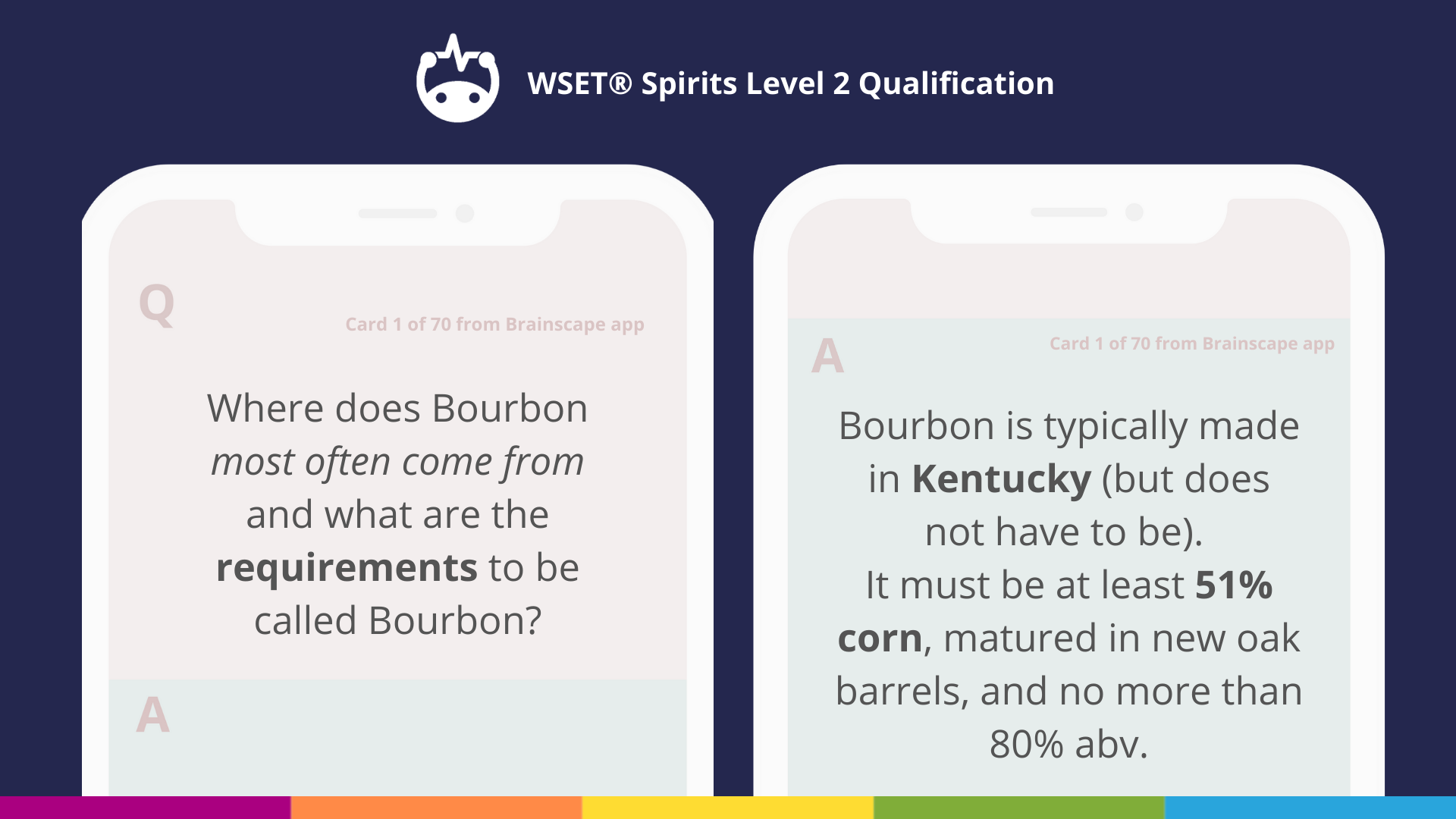Unlike wine and beer, which were discovered quite blithely by accident, the making of spirits has been an intentional voyage by humankind for many centuries. To process and distill a raw ingredient into a powerful, high-alcohol brew and then craft it to be pleasurable to drink, is an art form that has been through innumerable trials and tribulations. (And hangovers too, no doubt.)
The fruits of this journey are literally hundreds of different spirits and liquors, from Bourbon, gin, and tequila, to whiskey, brandy, and sake. To many, spirits are a means of enjoyment and celebration; to others, like you, it is a source of intense curiosity and you’re here because you seek to unlock their secrets, broaden your knowledge, and advance your career!
This is exactly what the Wine & Spirits Education Trust’s (WSET®*) three-tiered spirits certification program offers! And this written guide will help you understand exactly what to expect from such an education and the various wine and spirits jobs that could become available to you with such qualifications behind your name.
In this guide we’ll be answering the following key questions:
- What is the WSET Spirits certification?
- Who can become a certified spirits specialist?
- What can I expect from the WSET Spirits certification?
- What wine and spirits jobs can you get as a certified spirits specialist?
What Is the WSET Spirits Certification?
The Wine & Spirits Education Trust, or WSET® for short, is a leading global authority in wine and spirits education, offering multi-tiered certification programs that specialize in either wine, spirits, beer, or sake. The WSET Spirits certification is a three-tiered program that provides a beginner (WSET Level 1 Spirits), intermediate (WSET Level 2 Spirits), and advanced education (WSET Level 3 Spirits) in the realm of spirits and liquor.
The wonderful thing about the WSET is that it isn’t only for people with designs on becoming a certified spirits specialist, sommelier, or distiller. If you’re a bartender, restaurateur, wholesale distributor, or brand marketer who wants to learn more about the industry in which you’re directly or indirectly involved, the WSET is a powerful qualification to have in your corner: for both the knowledge it offers and the prestige it brings to your résumé.
Alternatively, you may just be a beverages enthusiast with a devastating love of, for example, Scotch whisky and the thirst to learn more about it! Whatever your goals, the WSET spirits certification can bring great enrichment to your life and career.
Who Can Become a Certified Spirits Specialist?
Anyone can take the WSET Spirits exams, provided you have the right education and experience and have the passion to motivate you. The WSET spirits certification will help you with the necessary background knowledge while finding an internship or entry-level job in the industry will give you the hands-on experience you need.
Also, the further along you progress with the WSET spirits certifications, the better your job opportunities. So, if you want to become a certified spirits specialist, it’s advisable that you take the WSET Level 2 Spirits and even WSET Level 3 Spirits certification.
What Can I Expect From the WSET Spirits Certifications?
There are no formal requirements to enroll in any of the WSET’s spirits certifications, although you should be able to demonstrate WSET 2-level knowledge if you want to take on the WSET level 3. This is for a very good reason. It is a beast of a challenge.
With that said, here’s a detailed breakdown of each of the WSET’s three spirits certification programs and what you can expect from them …
WSET Level 1 Spirits

What’s it about?
The WSET Level 1 Spirits is a hands-on, beginner-level introduction to spirits for those starting a career in the industry or pursuing an interest in spirits. During this course, which has a minimum requirement of six guided learning hours with a WSET course provider, you’ll use your senses of sight, smell, and taste to explore the main styles and types of spirits.
What will I learn?
- The basic principles of spirit production.
- The main types and styles of spirits.
- How to serve spirits.
- Factors affecting the flavor of spirits.
- How to describe spirits using the WSET Level 1 Systematic Approach to Tasting Spirits® (SAT).
How do I pass the WSET Level 1 Spirits?
At the end of your course, you’ll take a closed-book exam of 30 multiple-choice questions with a pass mark of 70%.
WSET Spirits Level 2

What’s it about?
The WSET Level 2 Spirits is a beginner to intermediate-level qualification with a minimum requirement of 26 hours of study time, including 14 hours of classroom or online lessons. During this course, you’ll explore the fundamental production methods, principal raw materials, and serving principles used for the key spirit styles in much greater detail than the WSET level 1.
What will I learn?
- The characteristics of the principal international spirits and liqueurs.
- How production methods affect the characteristics of spirits and liqueurs.
- How to describe spirits using the WSET Level 2 SAT®.
How do I pass the WSET Spirits level 2?
At the end of your course, you’ll take a closed-book exam of 50 multiple-choice questions with a pass mark of 55% (yikes!).
WSET Spirits Level 3

What’s it about?
The WSET Level 3* Spirits is an advanced-level qualification for people who want a detailed understanding of spirits and liqueurs, and to develop the tasting skills required to accurately describe and evaluate a spirit. This course has a minimum requirement of 84 hours of study time composed of 30 hours of delivery (in a classroom or online by a WSET course provider); 51.5 hours of personal study and revision; and a 2.5-hour examination at the end of the course.
*It is recommended that you hold the WSET Level 2 spirits certification (or can demonstrate an equivalent level of knowledge) before enrolling for this course.
What will I learn?
- A detailed understanding of the techniques used in spirit production (the processing of raw materials, alcoholic fermentation, distillation, and post-distillation processes).
- Factors affecting the style and quality of eleven core spirit categories: Scotch whisky, Bourbon, rye whiskey, Tennessee whiskey, Cognac, Armagnac, Caribbean rum, Tequila, mezcal, vodka, and gin.
- An overview of 23 additional spirit categories, focusing on principal production methods, key styles, and labeling terms.
- How to taste and describe spirits using the WSET Level 3 SAT®.
How do I pass the WSET Spirits level 3?
How do I pass the WSET Spirits level 3?At the end of your course, you’ll take TWO exams: a two-part theory exam of 50 multiple-choice questions and short answer questions AND a practical tasting exam in which you are required to blind taste and assess two samples of spirits. A pass of 55% is required for both in order to attain your WSET level 3 spirits certification.
How Can Digital Flashcards Help Me Become a Certified Spirits Specialist?
Digital flashcard apps such as Brainscape and Mochi use decades of cognitive science to optimize your learning speed. In other words, by spacing out material over time, flashcards help you learn as fast as humanly possible, while automating the learning process and making you more likely to study.
Here at Brainscape, We've worked closely with a team of drinks specialists to break the entire WSET 1, 2, and 3 spirits curriculum into three separate collections of flashcards, each of which covers all of the content in the official WSET textbooks...
- Brainscape's WSET Level 1 Spirits flashcards
- Brainscape's WSET Level 2 Spirits flashcards
- Brainscape's WSET Level 3 Spirits flashcards

The real secret sauce lies in how Brainscape delivers this knowledge, which taps into the way your brain is biologically designed to learn to do so MUCH faster than traditional study techniques. (If you want to geek out on the science behind our app, check it out here.)
What Wine and Spirits Jobs Can You Get as a Certified Spirits Specialist?
The formal training offered by the WSET can place you on the path to becoming a certified spirits specialist, which can either be your full-time focus and occupation, or it can serve as a powerful leg-up in the restaurant, retail, and hospitality industries. The more you learn and the further you progress, the more unique and rare your skillset, and, therefore, the higher paying and more prestigious the jobs you will be considered eligible for!
On the subject of wine and spirits jobs, what opportunities are there for people with a WSET Level 1 Spirits certification and higher? Let’s take a look ...
Commercial Wine and Spirits Jobs
If you have a gift for sales and marketing and an interest in spirits, why not marry the two and get into retail sales at a bottle store, liquor merchant, or distillery? Or even sell wholesale and import/export? Alternatively, you could become a buyer, auctioneer, or consultant.
On the marketing side of things, there’s a brand ambassador, marketing manager, beverages journalist, or an events manager (true, the latter exists on the outskirts but your spirits knowledge can be super helpful nonetheless, especially for more formal events).
Service Jobs
As a server or bartender at a restaurant, bar, or hotel, having a formal spirits certification under your belt can take your service to a whole new level. Your qualification will make you far more desirable to high-caliber positions in fancier hotels and restaurants. You could also be considered for positions like restaurant host, beverages manager, or bar manager, or, hell, why not open your own pub or bar?
This applies across the hospitality industry from hotels, bars, and restaurants to luxury charter boats and cruise ships. The bottom line is, the WSET spirits qualification makes you much more hirable and desirable.
Spirits Production Roles
If you dream of working behind the scenes at a distillery or even crafting your own spirits brand, then understanding the fundamentals of production is essential. A formal education with the WSET will certainly create a favorable candidate out of you because employers won’t have to train you from scratch. And this may also help you skip steps rather than spending months, if not years doing the grunt work before you’re handed a role with more responsibility.
Of course, a spirits certification is no substitute for hands-on experience, but it’ll certainly place you on the fast track for jobs like distillery worker, cellar technician, lab technician, and, eventually assistant and even head distiller!
A Final Word on Getting Your Spirits Certification
A spirits certification from the Wine & Spirits Education Trust (WSET) gives you the knowledge and, therefore, the confidence to talk and sell (and upsell) to customers, retailers, buyers, brands, and other spirits professionals, and not feel intimidated by the industry.
It also tells employers that you take a passionate, dedicated, and disciplined approach to your work. After all: it requires a serious investment of time and focus to acquire a WSET spirits certification. And this can put you on the fast track to better-paid wine and spirits jobs with more responsibility and prestige.
If you’re on the cusp of this journey toward becoming a certified spirits specialist, we wish you the very best of luck! Armed with this advice, flashcards from an app like Anki or Brainscape, and your ambition to succeed, you should have what it takes to crush any certification exam you decide to take on!
*Disclaimer: Brainscape has worked with top wine and beverages experts to supplement the official publications and preparation offered by WSET.
Additional Reading
- How to Get a Job in Wine with the WSET Level 1 Qualification
- WSET Beer Study Guide: How to Pass Level 1 & 2 with Distinction
- How To Pass The WSET Level 1 Sake Certification Exam
References
Kang, S. H. (2016). Spaced repetition promotes efficient and effective learning. Policy Insights from the Behavioral and Brain Sciences, 3(1), 12–19. https://doi.org/10.1177/2372732215624708
Orbell, S., & Verplanken, B. (2010). The automatic component of habit in health behavior: Habit as cue-contingent automaticity. Health Psychology, 29(4), 374.
Wine & spirit education trust (WSET). WSET. (n.d.-a). https://www.wsetglobal.com/
Xu, J., Wu, A., Filip, C., Patel, Z., Bernstein, S. R., Tanveer, R., Syed, H., & Kotroczo, T. (2024). Active recall strategies associated with academic achievement in Young Adults: A systematic review. Journal of Affective Disorders, 354, 191–198. https://doi.org/10.1016/j.jad.2024.03.010
